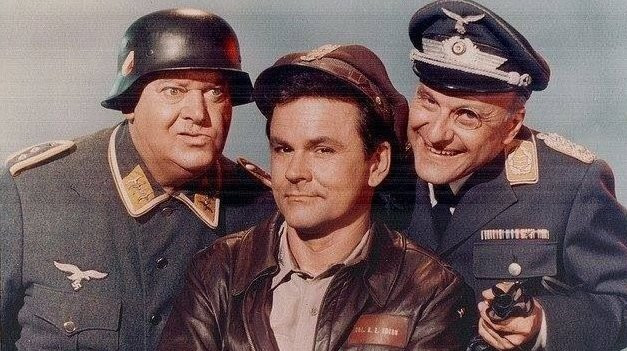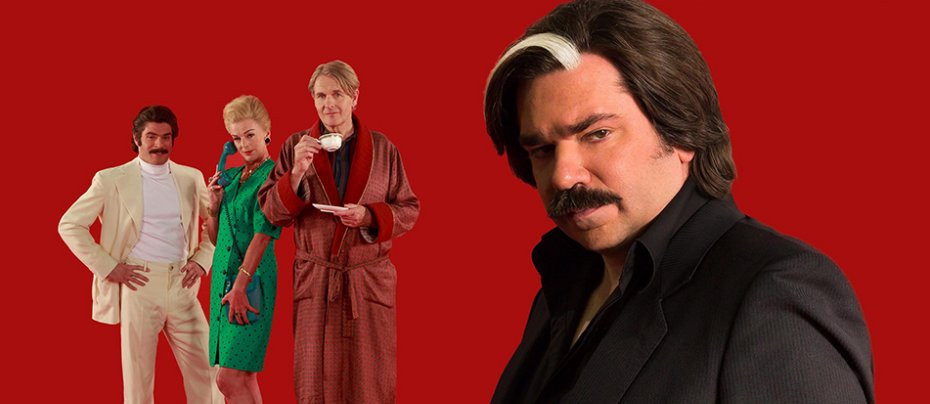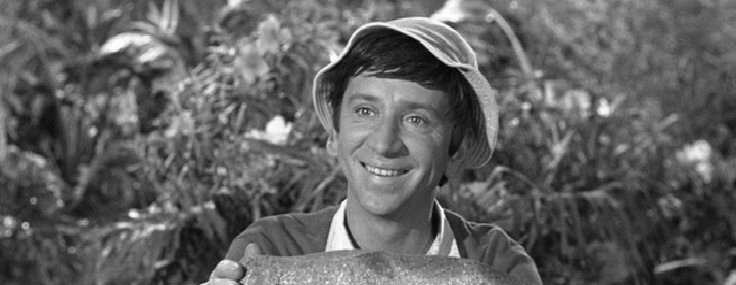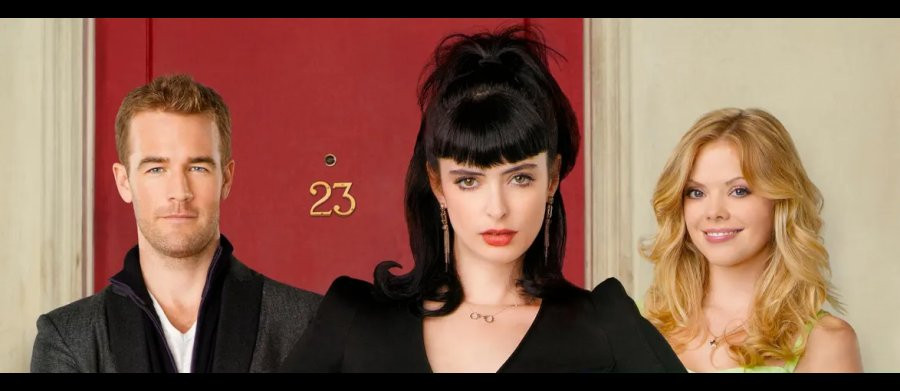
Don't Trust the B---- in Apartment 23
2012 - United StatesReview: John Winterson Richards
Being a family friendly website, we choose to stick with ‘Apartment 23’ to describe a project that went through several different titles during its development. In the end ABC, very unwisely, chose to broadcast it as Don't Trust the B- in Apartment 23, a slightly more polite version of its original title when it was under serious consideration at Fox, Don't Trust the Bitch in Apartment 23 - Fox being Fox, classy as ever. The long title has at least the merit of telling us exactly what the show was all about - and why it failed.
ABC should have stuck with ‘Apartment 23’. It is shorter, easier to remember, and also easier to use in casual conversation - 'Don't Trust the... etc' is a bit of a mouthful when asked what you saw on the box last night. There is also a reluctance on the part of the general public to use or even imply words like "bitch." Even if one does not mind using such words oneself, it is wise to be cautious unless one is sure that the same is true of the person or people with whom one is talking. Television types tend to assume everyone is like them and underestimate how large segments of the target market dislike what they consider to be bad language.
This seemingly trivial mistake limited the potential of the show to spread by word of mouth. Perhaps the television types assumed it was already so outrageous that anyone put off by the word would not watch it anyway. They were wrong. The show has a certain charm that might have appealed to the mainstream, and its satirical swipe at modern metropolitan life might even have found a market among more conservative viewers. At the same time, limiting the word of mouth meant the show could never have turned into the "cult" item that it seemed to be crying out to be. As a result, it never found its market, which is a great pity because there was a lot about it that was both original and funny.
It is a slightly surreal comedy which is best described as 'Breakfast at Tiffany's' if Holly Golightly was a total... well, the b-word is rude but by no means inaccurate.
Chloe - basically Evil Holly - is, like Holly, a party girl who exploits her good looks ruthlessly to enjoy a life of selfish hedonism. Like Holly, she is played by an actress who looks as if she could do with a good meal but still maintains a striking presence. However, Krysten Ritter, who plays Chloe, has none of Audrey Hepburn's sweet vulnerability and fragility as Holly. They are not needed.

By any objective standard, Chloe is a truly appalling human being. Used to her looks getting her whatever she wants, she goes through life with total self confidence based on a sense of unjustified entitlement that is absolute. Although she can turn on a certain superficial charm for short periods, its insincerity is obvious. Underneath is an attitude of unthinking arrogance: she assumes the world exists to serve her - because it usually does. She goes beyond mere selfishness to deliberate cruelty if it amuses her. She has no ethics and apparently no feelings, apart from for what might impact on her or entertain her. Yet people are still attracted to her like moths to a flame - and so is the viewer.
This is entirely due to a brave, committed performance by the young Ritter. Although she was later to find her greatest success in a dramatic role as the eponymous Jessica Jones, Ritter was relatively inexperienced when 'Apartment 23' offered her first big break. It remains the best showcase for her talents before the more complex role of Jessica. Like her character, Ritter shows total self confidence in taking risks that pay off enormously. A character who ought to repel becomes inexplicably compelling.
We see Chloe, as we saw Holly, mainly from the perspective of a relative innocent in New York. In 'Apartment 23,' this is a female would-be businesswoman, June Colburn (Dreama Walker) rather than the old cliché of male writer. June comes from Indiana, the State that gave us the fictional Pawnee in Parks and Recreation, and June seems to have a great deal of the perky optimism and energy of that show's Leslie Knope.
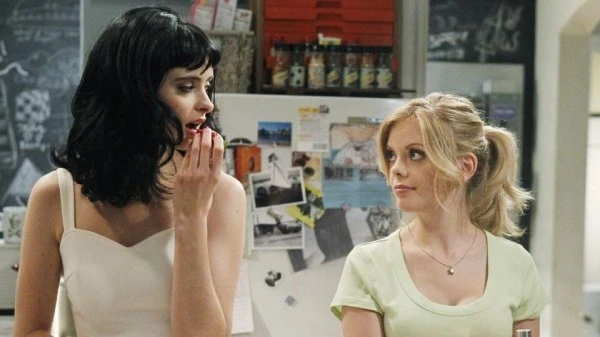
She is also very wide eyed, both literally and in her naivety. The firm where she dreamt of building a successful career is shut down the day she starts there. Almost simultaneously, she discovers that her new flatmate, Chloe, is running a scam and she is the latest victim. Chloe finances her lifestyle through a number of established schemes, one of which is taking deposits from new flatmates and then driving them away by making life in the flat intolerable due to her eccentric lifestyle.
A combination of Midwestern stubbornness, a determination to see the best of people and situations, and the brutal fact that her unexpected firing leaves her little choice, makes June particularly difficult to shift. Eventually Chloe seduces June's fiancé. This is not difficult since he has already been systematically unfaithful to June.
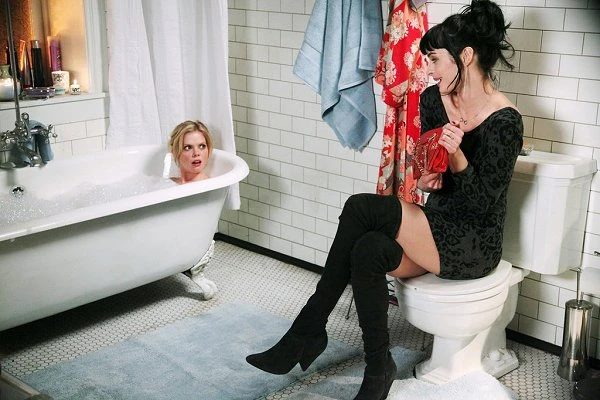
On discovering this, June decides to be grateful to Chloe for revealing his true nature. Chloe decides to take this as a win, and is in any case intrigued by June and perhaps also by the novelty of having a normal friend. So she ceases her efforts to be rid of June, at least for the time being, and the two settle down to a state of armed truce. Churchgoing June, still wanting to see the best in people, has hopes of redeeming Chloe, while Chloe sees herself, when she can be bothered, as a sort of mentor to June in the brutal realities of the Big City.
June enters Chloe's rather eclectic social circle that includes their voyeuristic neighbour (Michael Blaiklock), Chloe's stalker (Liza Lapira), the actor James Van Der Beek, and his loyal Personal Assistant (Ray Ford).
Van Der Beek, not so well known elsewhere as he is in the United States as the star of Dawson's Creek, a teen drama, plays a fictionalised version of himself. There was already a well established trend of actors playing increasingly grotesque characters with their own names and public biographies in Extras, Episodes, and Life's Too Short. Van Der Beek, very courageously, takes this to a new level of self-humiliation. He is presented as Chloe's male alter ego, her partner in crime, and her - usually Platonic - best friend. They share the same selfish egotism, which makes them oddly mutually dependent.

At the same time, the Van Der Beek character retains the strange desire to be loved and respected by strangers that is so common among professional actors, even psychopathic ones. This is something that Chloe does not have, so it is a weakness in James she does not hesitate to exploit. He is vain, oversensitive to anything that puts him in a negative light, and desperate to "reboot" his career, which has been in rapid decline since its early peak. This leads him to an ill-considered marketing campaign for his own brand of blue jeans, participation in a television dancing competition (which is something he apparently did in real life), and attempts to involve himself with various film projects for which he is obviously unsuited.
His portrayal of a Cockney of the School of Dick Van Dyke in a Guy Ritchie film is particularly amusing - and another proof of the principle that it is the sign of a good actor to be able to portray a bad one. Anyone can act badly or pretend to act badly, but it takes real perception to try to act well and still be that little bit off that makes all the difference.
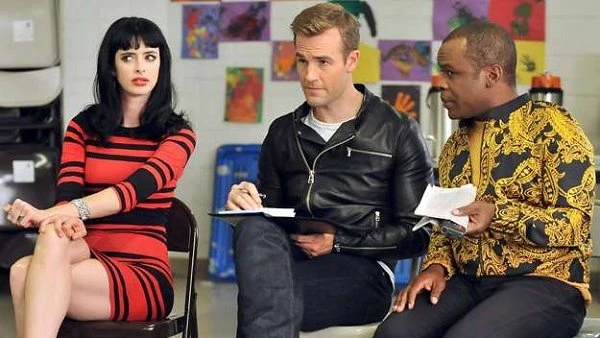
Luther, his PA, devotes a great deal of the existence to saving James from himself and maintaining his illusions. So, more surprisingly, does Chloe, even if there is usually a selfish reason behind her rare unselfish acts. To that end, she poses at one point as the uberbitch Managing Editor of a fashion magazine - and proves frighteningly good at the job.
It is this gradual revelation of new layers of Chloe - while as the same time retaining her essential superficiality - that provides much of the entertainment in 'Apartment 23.' In another episode June discovers that Chloe is very popular in Japan, where she was the model for a character in a popular manga book translated as "Tall Slut, No Panties."
The greatest reason to regret the early cancellation of the show is that it would have been interesting to know what else the writers had dreamed up for her backstory. Second greatest is never finding out what further humiliations they had in mind for poor James.
Yet perhaps it was not a show that could have lasted long anyway, even if it had been better marketed. There may have been to limit to how much time the viewer could have spent in Chloe's company before her selfishness became too much. There was also a time limit to her relationship with June: sooner or later, one would have worn the other down, and either Chloe would have ceased to be Chloe or - far more likely - June would have ceased to be June.
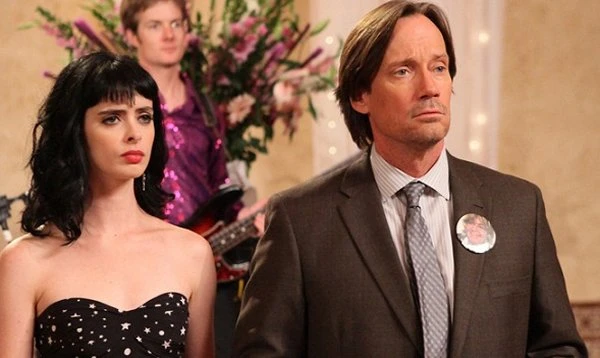
It was, in any case, never a show for the mass market. One either likes this sort of thing or one does not, and most do not. For those who do, 'Apartment 23' is a good example of what recent comedy can do well: it played with format, it was not afraid to take chances, and it was deliberately kooky. That last can be very irritating, but 'Apartment 23' soothed any potential irritation with a healthy application of dark humour. Indeed, it sometimes seems like a satire on the manufactured kookiness of the likes of 'New Girl.' The line between loveable eccentric and psychopath may not be as clear as Hollywood likes to assume. 'Apartment 23' definitely crossed it and never looked back.
Seen this show? How do you rate it?
Seen this show? How do you rate it?
Published on July 21st, 2020. Written by John Winterson Richards for Television Heaven.







